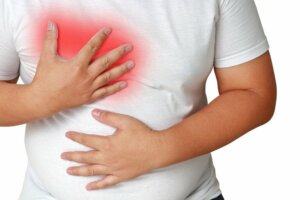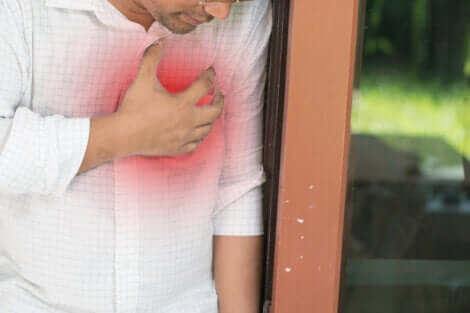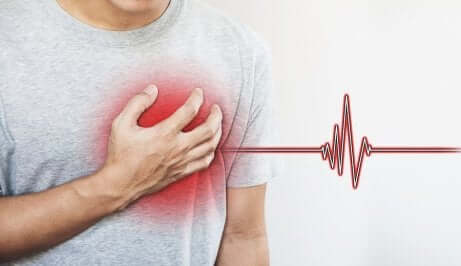7 Common Symptoms of Heart Problems


Written and verified by Doctor Carlos Fabián Avila
Certain symptoms indicate that your heart isn’t working as it should. If your family has a history of cardiovascular problems, it’s especially convenient that you know them, so that you take them into account, identify the symptoms, and discuss them with your doctor.
One of the most important organs in the body is the heart. Hence, it’s often referred to as the “engine” of life” and the like. However, the truth is that it’s often neglected. For this reason, heart problems have become increasingly common in the population.
In this regard, heart problems can impact quality of life. In general, they’re the result of maintaining unhealthy habits (such as a sedentary lifestyle or an unbalanced diet) and of downplaying the signals that the body sends you.
Below, we’ll tell you about the seven possible symptoms that indicate that your heart isn’t working as it should. Thus, you should correct some habits and improve your lifestyle.
Pay attention to the symptoms of heart problems

1. Chest pain or angina
When chest pain is caused by a heart condition, the heart is receiving blood with little oxygen.
Angina is a crushing pain that seems to strangle the heart. It occurs as a consequence of the lack of oxygen in the heart muscle. Its main causes include atherosclerosis and coronary artery spasms.
Pay close attention if the pain intensifies and causes a feeling of heaviness and tightness. Additionally, keep in mind that pain or angina can be caused by other conditions, such as anxiety.
2. Arrhythmias
Heartbeat has a fairly regular timing. Typically, you don’t even notice it when it’s appropriate. However, if you notice that your heart is beating too fast or too slow, consult your doctor.
Irregularities can indicate that your heart isn’t working as it should. Arrhythmias can be accompanied by other discomforts, such as: palpitations, dizziness, chest pain, and even loss of consciousness.
You should know that certain types of arrhythmias go unnoticed and are only detected with diagnostic tests.
The experts of the Spanish Heart Foundation comment that “the reference diagnostic test is the electrocardiogram, which records cardiac electrical activity. Sometimes, other tests can be used, such as Holter, which records cardiac electrical activity for a longer period of time”.
Discover: Electrocardiogram or EKG: Seven Steps to Interpret It
3. Sleep apnea
Sometimes, sleep apnea is overlooked, but this may be a symptom that your heart isn’t functioning properly. This problem stops air from entering the body.
In some cases, it’s very short and lasts a few moments and, in others, it can last minutes. It occurs as a result of a respiratory problem.
Sleep apnea, as its name implies, usually occurs during sleep. In fact, it can occur up to more than 30 times in an hour. It poses a great health risk as a heart attack can occur because not enough oxygen reaches the brain and heart.
4. Swollen legs and feet
Do you eat lots of salt? Have you walked more than you normally do recently? It’s common for your legs and feet to swell in both of these cases.
However, this shouldn’t happen to you every day, as it may be a symptom of a fluid retention caused by heart failure or an arterial condition.
The experts of the Spanish Heart Foundation have made available a nutrition section to better guide patients and the general public.
5. Shaking and shortness of breath
It’s not normal for you to have to constantly fight for breath or for you to frequently feel tired and breathless. If this happens for no particular reason, you should ask yourself whether your heart is working properly.
In this sense, it’s important for you to monitor your habits. If you’ve changed your routine, or started a new physical activity in the past couple of days, this lack of air may be normal.
6. Sexual dysfunction
One of the earliest warning signs of possible heart disease is erectile dysfunction, especially in patients between 40-50 years old.
If you have another condition or if you’re over 50, it’s important for you to go see a doctor you trust. Together, you’ll be able to determine if your sexual dysfunction is caused by a heart problem or some other condition.
7. Broken heart syndrome

In broken heart syndrome, patients, after a profound mood alteration, increase the doses of catecholamines, which are substances similar to adrenaline.
This sudden increase is due to the fact that, in high states of anxiety and stress, the body seeks to release substances that normalize the body. Fortunately, it’s a temporary nuisance that doesn’t cause permanent damage in 90% of cases.
General tips to keep your heart healthy
As we mentioned, if you consider that you’re experiencing the aforementioned symptoms, monitor the frequency of their appearance and, if it’s very high, go see your doctor for an early evaluation and diagnosis. Once they gives you some guidelines, you must follow them to avoid setbacks.
Along with following these guidelines, it’s essential to lead a healthy lifestyle. To do this, you need to review, correct, and improve all those habits that aren’t providing benefits. The three most important habits to correct are good nutrition and hydration and exercise.
All cited sources were thoroughly reviewed by our team to ensure their quality, reliability, currency, and validity. The bibliography of this article was considered reliable and of academic or scientific accuracy.
- García, M. de la P., Morlans, L., & Sanjoaquin, A. C. (2011). Accidente cerebrovascular. In Manual del residente en geriatría. https://doi.org/10.1111/j.1462-2920.2010.02190.x
- Cecconi, A., & Vivas, D. (2013). Corazón y deporte. Medicine (Spain). https://doi.org/10.1016/S0304-5412(13)70674-7
- Aragoncillo Ballesteros, P. (2009). Anatomía del corazón. Libro de La Salud Cardiovascular Del Hospital Clínico.
- Fajuri, A. (2009). Manual de Arritmias, 2009 – Dr. Alejandro Fajuri. Manual de Arritmias. https://doi.org/10.1016/S0002-8703(33)90741-3
This text is provided for informational purposes only and does not replace consultation with a professional. If in doubt, consult your specialist.








